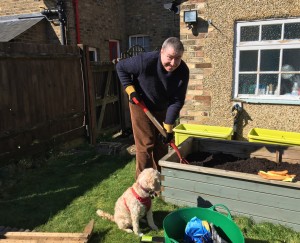By Alex Fox OBE, Chief Executive of Shared Lives Plus and Trustee at the Social Care Institute for Excellence
This originally appeared on Alex's blog, which also has the latest news - and a link to a podcast from homesharers Norman and Jorge.
Across the UK, thousands of Shared Lives households are at home as self-isolation becomes mandatory. This means that disabled people, people with mental health problems and others who need significant support are living in a safe place with their Shared Lives carer and for many, this is the safest place they could be. Unlike other services which rely on a staff rota, no one need come in and out of the home and the household can be more resilient and less disrupted by self-isolation than services which lose workers who are self-isolating but currently unable to get tested.
We also know that Shared Lives households are under pressure:
- 80% of Shared Lives carers are over 50 and 20% are over 70 and themselves in the at-risk group.
- Usually, Shared Lives should not be 24/7 care, but at the moment it is: this can mean huge pressure on households as routines are disrupted and there is no break from caring for someone who is distressed and whose behaviour may be difficult to manage.
- Like others, Shared Lives households are largely without protective equipment (PPE) and facing shortages of basics and food caused by panic buying.
- As short breaks and day support services are cancelled, many self-employed Shared Lives carers are without income, and the government has not yet addressed this for the self-employed. This also means there are Shared Lives carers with capacity to do more and who want to help. We’ve had members wanting to open their homes to patients and NHS staff.
At Shared Lives Plus, our team moved quickly to 100% home working and online and have been working flat out on two priorities for our members: inform and connect. People need the right information – not always easy when most government info has been unclear, incomplete or has needed to be corrected. Not helped by government making a drastic u-turn in its strategy (which was the right thing to do: their modelling turned out to be wrong) but then telling people nothing had really changed: far better to have been clear that the strategy had changed and why. Connection will be of growing importance the longer this situation continues.
We are addressing the four pressure points above:
- We have issued guidance for local organisations on identifying and prioritising the households most at risk, mitigating risks where possible and planning for possible scenarios, including infections within the home and Shared Lives carers being unable to care. We have outlined fast-tracked procedures to get new support carers approved.
- The key message from our guidance on supporting Shared Lives households under pressure is to help the household build its resilience and two kinds of connections: with other Shared Lives households and with neighbours. We are aiming to get a new Positive Behaviour Support advice service up and running shortly if we can resource it. We’re helping members share what’s working and the team are taking calls where people are struggling.
- We have been ensuring that Shared Lives carers, and community care services more generally, are being considered along with other social care services, for PPE and giving practical advice. The UK’s failure to plan for PPE demand mystifies me and has left thousands of the people we rely on most at unnecessary risk. This appears to be being rectified, but local problems are still huge. We’ve written to all the supermarkets explaining what Shared Lives carers and Homesharers are why they need access to food.
- Government announcements are imminent about support for the self-employed. In the meantime, our advice to Shared Lives schemes has been: do everything you can to support your Shared Lives carers. We will need everyone during this crisis and in the recession which will follow it. Councils have been given funding to support stability in the social care sector, and the good ones are using it to keep providers afloat and social care workers in this vital workforce. We are supporting Shared Lives schemes to identify their spare capacity and consider how Shared Lives carers who are not currently working can safely support households who are struggling, and respond where possible to the need to discharge thousands of people from hospital. Virus testing, adequate PPE and ensuring people and organisations are working as part of one team will be vital in making this work.
I’d like to thank the 10,000 Shared Lives households and 500 Homeshare households who are contributing so much to keeping people safe and well during this crisis, and the Shared Lives Plus team who have made me so proud to work for such a great charity these past couple of weeks.







